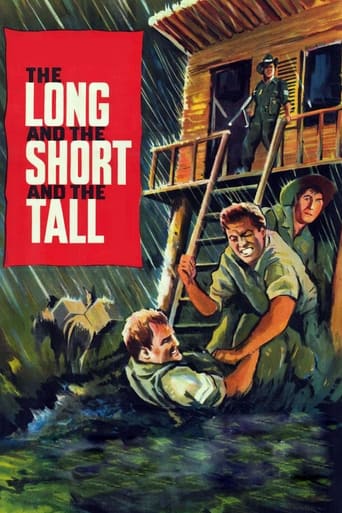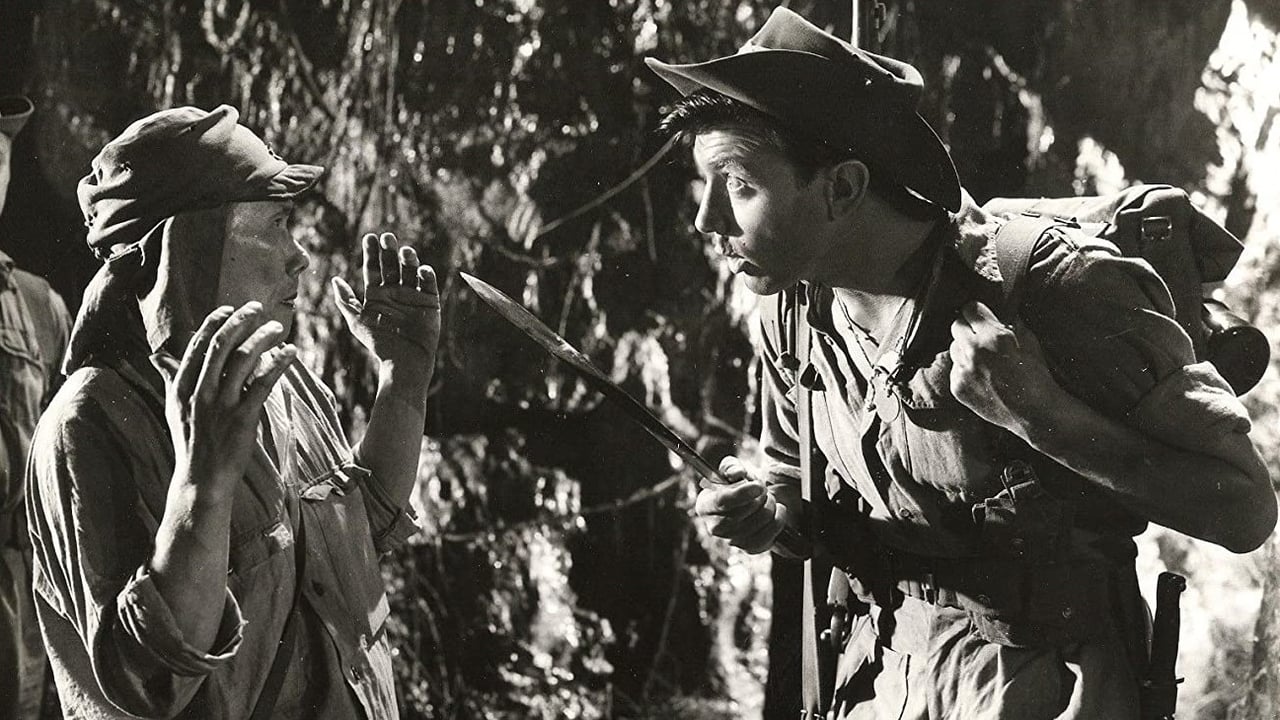James Hitchcock
The title "The Long and the Short and the Tall" is taken from the lyrics of "Bless 'Em All", a rather nonsensical soldiers' song from the First World War which enjoyed fresh popularity during the Second. It would appear that the song is not well-known across the Atlantic, as it was released as "Jungle Fighters" in both the USA and Canada.The action takes place during the Burmese Campaign of 1942. Seven British soldiers on patrol in the jungle capture a Japanese prisoner whom they nickname "Tojo". Much of the action revolves around their arguments over what to do with him. Their commander, Sergeant Mitchem wants to take the prisoner back to headquarters for interrogation. Several others, especially Mitchem's second-in-command Corporal Johnstone, want to kill him, but one man, Private Bamforth, argues strongly that they should spare his life and that killing a prisoner would be a war crime.The film was based on a stage play by Willis Hall. In the play Bamforth had been played by Peter O'Toole, and the director Leslie Norman (father of the well-known critic Barry) wanted to cast O'Toole in the film as well. The producers, however, wanted to go for a "big name"- apparently O'Toole did not count as such in 1961- and insisted upon Laurence Harvey. This proved to be a mistake, and not only because Harvey quarrelled not only with Norman but also with his co-stars Richard Todd and Richard Harris. Harvey's performance is the main reason why I disliked the film.In the opening scenes Harvey is not too bad, if you can overlook his rather dodgy Cockney accent. Bamforth is, to put it mildly, a difficult customer. He is the sort of barrack-room lawyer who knows the King's Regulations inside-out except the parts which state that insubordination and disobedience to orders are offences against military discipline. He takes a great delight in baiting his superiors Mitchem and Johnstone, but he does not just have a problem with authority. He has a problem with the rest of the human race, and dislikes his fellow privates as much as he dislikes the NCOs. He makes no effort to conceal his prejudices against people from other parts of Britain- he himself is a Londoner- and his constant taunting of his colleagues Lance-Corporal Macleish (a Scot), Private Evans (a Welshman) and Private Whitaker (a Northerner) is mean-spirited stuff, not mere friendly banter.The trouble is, Harvey works so hard to establish his character in the audience's mind as a complete bastard that we do not believe him when Bamforth suddenly and unexpectedly emerges as the conscience of the detachment, especially as he originally tries to humiliate Tojo by addressing him in a patronising pidgin English. ("Flingers on Blonce!"- this being how Bamforth imagines the Japanese would pronounce "Fingers on Bonce!" He is evidently unaware that the Japanese have difficulty with pronouncing the letter "L", which does not exist in their language, and certainly would not try to insert it into English words where it does not belong). Now Hall, Norman and Harvey probably intended us to accept Bamforth's attempts to do the decent thing as quite sincerely meant, but I was left with the impression that this was only part of his ongoing campaign against authority and that if the rest of the detachment had wanted to spare Tojo, Bamforth would have voted to kill him.Of the other actors, the best is probably Harris as Johnstone, a man who finds it difficult to keep his violent emotions under control. Todd was something of a specialist in war films (as were some other British actors of the period, such as John Mills and Kenneth More), but he makes Mitchem a rather anonymous figure and this is not his best performance.Norman would have preferred to shoot the film on location, but during this period the British film industry rarely had the financial resources to travel abroad for filming, and the jungles of South-East Asia were definitely off-limits. ("Bridge on the River Kwai", although many of its stars were British, was actually an American film). The film, therefore, had to be made in a studio, and it shows. The budget for creating realistic scenery was obviously limited.Both play and film were controversial when they came out. They were particularly unpopular among British veterans who had fought in Burma, partly because of the implication that British soldiers might kill an unarmed prisoner, but also because the patrol are portrayed as an incompetent and undisciplined rabble. The play was at one time popular as a set text for English Literature O-Levels, although (as with many set texts) this may be a reflection not of its literary merits but of the fact that it is an easy work to write an essay about. I have never seen the play on stage, but then it is rarely performed these days. As for the film, it comes across as very dated today. Its main point of interest is that it represents a move away from the gung-ho, patriotic war films of the fifties towards the more questioning, sceptical world view of the sixties, but it does not represent a very interesting treatment of its theme. 4/10
malcolmgsw
I remember that when this film was released it raised a lot of controversy amongst the soldiers that fought in the Far East.They were upset at their representation as an undisciplined rabble and at the proposition that they would kill an unarmed prisoner of war.There are a number of factors that prevent this becoming a great film.Firstly there is the obvious artificially of the jungle.Those in TV's It ain't half hot look more realistic.Secondly there is the shear theatricality of the performances.Not the usual stiff upper lip type of film.It has all the characters shouting at each other at the top of their voices.The Maps didn't need radio detection.Thirdly there is the performance of Laurence Harvey determined to make sure that everyone knows who is the star of the film.Shame that Peter O Toole didn't get to reprise his stage roll.I was unable to see this on its release as it was an X certificate and I couldn't pass for 16.Difficult to believe this now.
Prismark10
The Long and the short and the tall is a stage adaptation but was also a set text for English exams for 16 year olds.The film is during Burma in 1942 which is occupied by the Japanese. A group of seven soldiers expert in sonic deception take refuge in an abandoned hut in the jungle because the Japs are nearby.When a lone Japanese soldier is captured tension rise further. Sergeant Mitchem who is in command wants to take the prisoner back to HQ for interrogation. However the soldiers argue amongst each other, even if it concerns a seemingly innocent item such as a cigarette pack that the Japanese soldier has amongst his possession.Gruff Private Bamforth a barrack room lawyer who dislikes authority also becomes becomes the conscience of the platoon as the others wish to kill the captured soldier.I read the play for my English exams and also watched the film at the time. I recently rewatched it after almost three decades. Its a low budget affair directed by Leslie Norman (father of famed film critic, Barry Norman.)You can tell that it is a studio bound production, the jungle scenes look very fake and its also too brightly lit. The film also has a lot of shouting which indicates its stage origins. You would have thought that with all the shouting the Japs would have discovered the soldiers much earlier.The cast is very much a who's who of 1960s British cinema. Laurence Harvey is the standout in a film that also contains Richard Harris, David McCallum, Ronald Fraser and Richard Todd. It examines the morality and psychology of war but looks rather dated.
oOgiandujaOo_and_Eddy_Merckx
The Long and the Short and the Tall is perhaps the most human film I've ever seen. It's meant to be a war film set in the Burmese Jungle, although with absolutely no contour to the ground, and the movie backgrounds all-in-all resembling Kew Gardens or a Rousseau painting, a rather less exotic location must be surmised. With absolutely minimal amounts of fighting you could mislead people by even referring to it as a war movie.The movie follows a platoon of stupid and weak men, I do not for one moment mean that in the sense that they are decadent or immoral, but they struggle for understanding and willpower; I wouldn't have been surprised to see the radio operator ask the Sergeant for a blanky. The Sergeant is a clearly incompetent man, who once got busted down a stripe for losing his patrol, as if it were something easily lost. I stress though that he's not a lazy man, and these two things are often conflated in the movies. The Dream Factory tends to suggest that human limits are to be found only at the limits of our imagination, however most people are profoundly challenged to just get by in life, strive as they might.The 'jock' lance corporal Macleish is a dumb, proud, and self-righteous man, but not in the normal sense of the word, he's not vainglorious at all, he's simply so stupid that he interprets the world via a small and therefore secure moral framework. When he preaches to his leaders about the Geneva Convention, he's not doing it out of some sort of profound understanding, but merely because the Geneva Convention is a rule, and he finds rules easy to grope his way in the dark with.The only one in the bunch who appears to have half a brain says at one point that, "I just do as I'm told". This reminds me of a scene in Mad Max where a guy says to the Toecutter, "Anything you say", to which the Toecutter replies, "Anything...I...say, what a wonderful philosophy you have".These severely challenged men have a moral decision to take, will they manage to do the right thing? Or will they blindly concentrate on the insignia on each other's uniforms? What I like about this film is that we are mostly like that, severely challenged, and I think it's incredibly rare that this is ever acknowledged at the cinema.


 AD
AD


